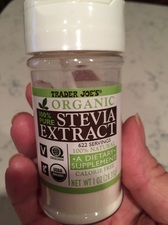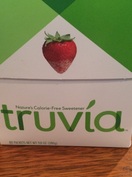
Sweeteners can be confusing, but without much
research you will find most are carcinogens. There
are a hundred reasons to stay away from the
pink, yellow and blue packets.
What hope there is
for safe sweetness can be found in the green packets
and what is in those varies.

All things sweet alert your system to produce insulin. This puts your adrenals and cortisol into gear so that the coming sweetness can be properly managed. When there really is no food behind that sweetness you send a false alert. Too many of these false alerts can set you up for trouble. The bottom line is you can overdo any sweetener. They all can be addictive and confusing to the body.
When it comes to the packets on your restaurant table, we are clear that the yellow, pink and blue are carcinogens. The green packets of sweetener are derivatives of the stevia plant which can be 100% natural if you buy right.
Your best choice in stevia is organic, pure stevia without other ingredients. It is simply the leaf of the stevia plant that is processed and sold in a powder form. This herb is about 200 times sweeter than sugar and so only takes a tiny pinch to sweeten a drink. If you were to chew the raw stevia leaf you would taste its sweetness immediately.
When stevia is sold in bulk and packets there can be additional ingredients that contaminate this pure resource. These additives, used as extenders, can be lactose and a number of other products that bring purity into question. Some of these less than pure forms are reported to be only about 1% stevia.
Truvia advertises to be “Nature’s Calorie-Free Sweetener.” Unlike pure stevia, it contains primarily erythritol which has some roots in nature, but is processed and uses a derivative form of stevia called rebiana, plus natural flavorings. Erythritol is known to cause gastrointestinal issues with stomach rumblings and loose stools in some, but to date, there are no warnings about serious side effects. Using the pure product means less tampering with nature.
Stevia is known to lower blood pressure and blood sugar. It has no compelling science that supports it being harmful, although there are those with ragweed allergies that claim to be troubled by it. It is not a know carcinogen.